Oct 30, 2018
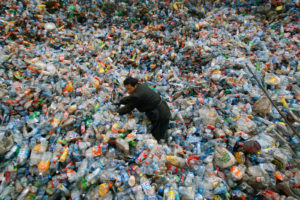
A worker sorts plastic bottles at a recycling center in China.
Last year, the Chinese government tightened its restrictions on recyclable trash exported by the U.S. China has historically imported 45% of the world’s plastic and paper waste since 1992 with contamination rates as high as 5% per bale. Now, China only accepts bales containing less than 1% of those impurities. It is a big change that will be challenging to meet.
“The Chinese waste import restrictions have disrupted recycling programs throughout the United States, and affected tens of millions of tons of scrap and recyclables since they were imposed in 2017,” said David Biderman, executive director of the Solid Waste Association of North America. “They are the most important change to these programs in at least a decade.”
These new restrictions have drastically impacted our cities’ recycling programs. To process and sort the materials, many recycling centers across the country have had to increase prices to meet China’s lower contamination rate for acceptable material leading to consumers taking a financial hit. Items that do not meet quality standards for recycling bales must be shipped to other locations, such as in Vietnam. That means higher transportation costs, which ultimately affect residents and businesses.
Recycling programs are taking further efforts to reduce impurities in our recycling bales by raising awareness on the issue. Educating consumers on how to properly sort wet food material like banana peels, coffee grounds, and food-soiled paper to keep recycled paper dry and clean will be critical for complying with China’s new quality requirements.
WHAT CAN I DO?
- The best thing you can do is properly sort your materials, making sure that wet, non-recyclable items are composted or tossed in the garbage.
- Give your recyclables a quick rinse, take your plastic bags back to stores or reuse them, and compost your food scraps (backyard composting is an option if this service is unavailable in your community).
- See your cities recycling guidelines and sorting guides for a list of what goes where (confusingly, accepted items vary by city due to different processing capabilities).
To learn more, click below:
https://www.npr.org/sections/goatsandsoda/2018/06/28/623972937/china-has-refused-to-recycle-the-wests-plastics-what-now
Oct 29, 2018
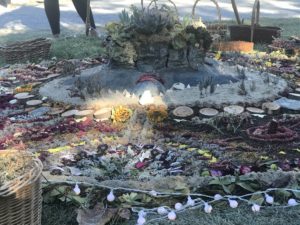 By: Nicole Newell, Sustainable Landscaping Program Manager
By: Nicole Newell, Sustainable Landscaping Program Manager
Permaculture enthusiasts from all over the country and beyond gathered at the Solar Living Institute to attend three days of workshops, keynote speakers, panels, skill shares, ceremonies and so much more. This was a gathering of authentic people genuinely working at creating a world that works for everyone. I walked away from the convergence inspired by the community initiatives. Here are a few that stood out:
Ann Kreilkamp, the founder of Green Acres Permaculture Village, spoke about this intergenerational, intentional community. Located in a suburban neighborhood in Indiana, it includes three adjacent homes, permaculture gardens, pathways and common areas (two greenhouses, a workshop space and a chicken house). A small CSA has evolved from the garden and every Thursday, a meal is shared. Ann aims to transform the paradigm from a culture of complaint into a culture of creativity. She gave an example of a “mistake” made in the placement of a structure. A cob wall and pizza oven was built in a location that resulted in a neighbor complaint to city officials. Ann was angry at the neighbor yet had the wisdom and self-reflection to pause before acting. The residents at the village recognized that this structure was placed on the edge of the property and saw the flaw in the design. They decided that instead of fighting the complaint that they would break down the wall through a “Ceremony of Impermanence” and have a community potluck. More time was spent looking for solutions in a group as opposed to brooding on the problem.
 A network of changemakers is growing through NorCal Resilience. This organization was founded in 2013 by Susan Silber and is committed to building resilience in our communities. The Resilient Hubs initiative is a new project aimed at creating neighborhood centers that demonstrate ecological features, prepare for disasters and engage the community. Jessica Bates owns Rising Spring Farm, a private home in the El Sobrante hills that is a growing example of this model. This urban farm displays many elements of permaculture design (swales, berms, perennial vegetables, composting and greywater use).
A network of changemakers is growing through NorCal Resilience. This organization was founded in 2013 by Susan Silber and is committed to building resilience in our communities. The Resilient Hubs initiative is a new project aimed at creating neighborhood centers that demonstrate ecological features, prepare for disasters and engage the community. Jessica Bates owns Rising Spring Farm, a private home in the El Sobrante hills that is a growing example of this model. This urban farm displays many elements of permaculture design (swales, berms, perennial vegetables, composting and greywater use).
While working in her front garden, Jessica naturally began to talk to inquisitive neighbors and a connected community started to emerge. Now a group of 12 neighbors shares a tool library and hosts work parties, crop swaps, and monthly neighborhood gatherings. They even purchase bulk food together. During one meeting they made a sign to place in the front window in the event of a disaster; one side it said OK, the other side said Need Help. It was a simple way to prepare for unexpected challenges during the times we live in.
How do we begin creating a site like this within our own communities? Community hubs are based on relationships. Here are a few suggestions:
- Go to where people already are. Work with existing networks within the community and begin to partner through shared goals.
- Show up to events and share what you have to offer. What are the needs and assets of each person, organization? How do we begin matching the needs of one person/organization and the assets of another?
There was synergy at the Permaculture Convergence. I was inspired seeing so many people and organizations partnering on projects, trying new initiatives, making mistakes, learning and actively working at building community.
Oct 15, 2018
By: Gabriela Estrada, Project Coordinator for Sustainable Solano
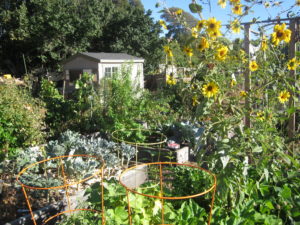 As a new member of Sustainable Solano, I have had the pleasure of interacting with different members that play key roles in advancing a message of Earth Care, People Care and Fair Share. While the message is clear and the work that has been put forth just as fantastic, it has been even more interesting discovering the instances and uniqueness of everyone’s relation to different aspects of sustainability and permaculture.
As a new member of Sustainable Solano, I have had the pleasure of interacting with different members that play key roles in advancing a message of Earth Care, People Care and Fair Share. While the message is clear and the work that has been put forth just as fantastic, it has been even more interesting discovering the instances and uniqueness of everyone’s relation to different aspects of sustainability and permaculture.
This month in Vacaville, while reflecting on this, I had the pleasure of learning about sustainable landscaping through presentations from local sustainable landscape experts, Jeff Barton and Kathleen Huffman.
The first of three workshops were led by Jeff Barton, whose lighthearted and authentic demeanor allowed for his audience to become engage and comfortably ask questions. During his presentation, Jeff spoke about his journey through sustainability and the tremendous impact that joining Sustainable Solano and digging his first swale had on him. This experience made him realize that “The solution to a lot of the problems is embarrassingly simple: We need to go back to basics and ask what the soil needs”.
This statement immediately allowed for people to reflect on and to firmly nod their heads. As the presentation continued, it became more of a conversation, and people voiced questions and concerns, to which Jeff did his best to answer, given his experience with similar problems. He shared that getting a pineapple sage plant, helps monitor the water of the entire garden, since it’s a plant that is very receptive to water usage, and encourage everyone to get one. I’m currently still looking for one.
While he spoke, it was clear that what he is passionate about the land and the people in it. For Jeff, it is a people first approach that will be key in making the world more sustainable. As such, we were encouraged as an audience to do just that, take care of our neighbor by sharing surpluses.
As the workshop continued, it was interesting to see how engaged people were and how responsive they were to the topic by chiming in their own ideas. While I really appreciated the level of engagement from everyone, what caught my attention the most was the level of engagement that his son (one of the youngest people in the room) had about the topic, and how full of curiosity he was. Given that he is the next generation, I see a bright future ahead of us.
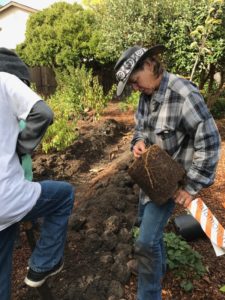 For the second and third workshop, I had the pleasure of hearing from Kathleen Huffman, who proudly shared with her audience that she was from Oklahoma and that she still said things like “Ya’ll”. After a couple chuckles from the room, she shared her experiences of growing up on a farm in Oklahoma, with wind mills, and the ways that her upbringing shaped her future. Throughout her talk, we got to see pictures of how she transformed her own backyard and learned about her design process.
For the second and third workshop, I had the pleasure of hearing from Kathleen Huffman, who proudly shared with her audience that she was from Oklahoma and that she still said things like “Ya’ll”. After a couple chuckles from the room, she shared her experiences of growing up on a farm in Oklahoma, with wind mills, and the ways that her upbringing shaped her future. Throughout her talk, we got to see pictures of how she transformed her own backyard and learned about her design process.
She shared how everyone can become more sustainable simply by changing our way of thinking and “finding better ways to take care of the soil in ways that makee sense for our needs”. As the presentation continued, it became clear that Kathleen was passionate about creating systemic long-term solutions for the world, and that the way she approached solutions was shaped by her own lived experiences.
In both workshops, Kathleen shared tricks she learned along the way that had helped keep her garden pest free like using coffee grinds from a local coffee roaster to take care of slug problems and using worms as little workers of her yard. As I saw her audience quickly writing notes and ask questions, I realized that one of the things I appreciated most about hearing her talk was her narrative and how she approached issues by observing and doing her research.
The principles of permaculture are Earth care, People care and Fair share ,and it is exactly these principles that both Jeff and Kathleen embody in their Sustainable Landscaping classes and efforts. Though they both come from different walks of life and relate to issues differently, one thing was clear: they both authentically showcase their love for the land and their belief in mixing the old and the new in order to create present-day solutions. And, while one of the main goals of creating a sustainable landscape is to conserve water, by attending these workshops, I gained so much more than tips to reduce my water usage. I got to see how two different passionate people use their authentic narrative daily to showcase solutions and to increase the possibilities of what the future can look like.
Oct 15, 2018
By Stephanie Oelsligle Jordan, Local Food Program Manager
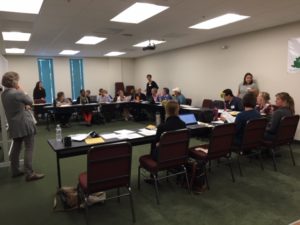 Sustainable Solano’s Local Food Advisory Board had their third meeting on September 18, 2018. This group was formed to support Sustainable Solano’s Local Food initiative, launched in October 2017, with the help of a USDA Local Food Promotion Program planning grant (to see a full list of Advisory Board members, click here). The meeting was graciously hosted by Solano Community Foundation in Fairfield, CA. (Many thanks to all the SCF staff who helped with set-up, lights and technology!) The meeting began with an overview by Elena Karoulina, Executive Director of Sustainable Solano, who stated that our original project – examining the feasibility of Community Food Centers in Solano County’s seven cities – has outgrown itself. We have gone beyond the grant and are now envisioning a larger Solano County Local Food System, which will require an alliance among farmers and other stakeholders in the County.
Sustainable Solano’s Local Food Advisory Board had their third meeting on September 18, 2018. This group was formed to support Sustainable Solano’s Local Food initiative, launched in October 2017, with the help of a USDA Local Food Promotion Program planning grant (to see a full list of Advisory Board members, click here). The meeting was graciously hosted by Solano Community Foundation in Fairfield, CA. (Many thanks to all the SCF staff who helped with set-up, lights and technology!) The meeting began with an overview by Elena Karoulina, Executive Director of Sustainable Solano, who stated that our original project – examining the feasibility of Community Food Centers in Solano County’s seven cities – has outgrown itself. We have gone beyond the grant and are now envisioning a larger Solano County Local Food System, which will require an alliance among farmers and other stakeholders in the County.
The USDA working group studied existing demand segments in the County: charity food, retailers, prepared food businesses (i.e. restaurants), and institutional customers. To get a better sense of the supply – and really understand the needs of our local farmers – we reached out to over 50 local farmers in the County and conducted interviews. We have at least 12 farmers who are interested and willing to work on the vision of a sustainable, local food system in Solano County. Another area of study was successful business models, which we could use as a springboard for our own business plan. These groups included Ceres Community Project (Sebastopol), Three Stone Hearth (Berkeley), Fresh Approach (Concord), Capay Valley Farm Shop (Esparto) and Sierra Harvest (Nevada City).
Next, Kristin Kiesel of UC Davis provided a summary of the data collection process. Her team has been working to map out the supply in Solano County as accurately as possible. They used data from aggregated data sources, including the 2012 Ag Census and 2017 Solano Crop Report. Disaggregated data (farm-level data) was available via the interviews by the working group, and Certified Producer Certificates, which farmers acquire so they can sell at farmers markets in Solano County. Her next step was to see where these data sources all connect and to identify the overlap. Also, she and her team have formal requests in to the U.S. government, to acquire more detailed and current Census data. All of this data, and the resulting findings, will go into the feasibility study for the project.
Following this report was an open discussion around what type of business plan makes sense, for our next step. Simone Hardy, Solano County Agricultural Commissioner, also provided a brief history of Solano Grown, and where it stands now. Greg Morrison and myself summarized a 6-week pilot, where he organized logistics of getting local farm products to a kitchen, I cooked dinners (using local product availability as the base for my menus), and then those dinners got delivered to the participants.
Conclusions and findings are as follows:
- We need to strengthen the infrastructure of Solano’s agricultural community – perhaps in the form of a farmer’s collective/co-op.
- Farmers need the most assistance with marketing and distribution of products.
- We need to build community awareness and education around the value of local food, and the system that would support it.
- We are considering partnering with Economic Development departments in Solano’s cities.
- We should connect farmers to institutions first (as opposed to end consumers), to ensure consistent demand.
- We need sustainable relationships between farmers and their customers.
- We need strong partnerships with organizations and stakeholders, within the local food system.
- When considering food access, our best efforts will be in “farm to school” program implementation.
- Our planning process needs to include as diverse a group as possible (i.e. minority farmers, diverse community members).
The meeting ended with everyone listing on paper the values of a local food system. We will compile these values and let that guide us forward.
Oct 1, 2018
Since the launch of its Sustainable Backyard program in 2014, Sustainable Solano has created 15 food-producing, self-sustaining demonstration “food forest” gardens across Solano County on both public and private land. These gardens are primarily irrigated by secondary water sources (diverted roofwater, laundry-to-landscape greywater systems). The food forests are designed based on a permaculture design system of food production that utilizes the wisdom inherent in natural woodlands and the understanding of beneficial relationships between plants to create and support landscapes that grow food for human use.
The program officially expanded to Vacaville in mid-August. Since the launch, sustainable landscape classes have been offered to Vacaville residents covering sustainable landscape design, wise-water practices and permaculture.
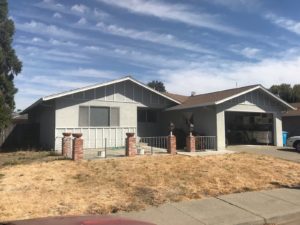 On Saturday, October 13th, residents will have a hands-on opportunity to help create Vacaville’s first private demonstration food forest garden, alongside their community, by attending the first demonstration installation workshop. The selected homeowner is a long-time Vacaville resident with a vision to transform his front yard from barren, dead grass to an oasis of edible and beneficial trees and plants. This demonstration food forest garden will be named “Healthy Futures” with the goal of providing nourishment and serve as a community asset to learn about sustainable landscaping.
On Saturday, October 13th, residents will have a hands-on opportunity to help create Vacaville’s first private demonstration food forest garden, alongside their community, by attending the first demonstration installation workshop. The selected homeowner is a long-time Vacaville resident with a vision to transform his front yard from barren, dead grass to an oasis of edible and beneficial trees and plants. This demonstration food forest garden will be named “Healthy Futures” with the goal of providing nourishment and serve as a community asset to learn about sustainable landscaping.
All are invited to help transform this lawn into a thriving ecosystem fed by secondary water sources. The garden will take three full days to complete and each public installation workshop will be hands-on.
This first workshop will focus on digging swales, diverting roofwater, planting fruit trees and sheet mulching to increase water-holding capacity and improve soil health. On Saturday, October 20th, with the guidance of Greywater Action, attendees will learn about greywater use and how to install a laundry-to-landscape system that diverts water from your washing machine to your garden reducing the need for potable water irrigation. Day three, Saturday, October 27th,, will wrap up the project with attendees planting a community of plants with multiple functions that support a healthy, diverse ecosystem, installation of water efficient in-line drip system.
The selection process for these sites are based on criteria such as yard access, greywater feasibility and sun orientation. Sites are assessed and selected by Sustainable Solano’s Advisory Board made up of dedicated Solano County residents aiming to raise sustainability awareness in Solano County.
There will be yearly ongoing workshops and tours of these demonstration food forest gardens on private and public land in each city. This project is made possible by funding and support of the Solano County Water Agency.


 By: Nicole Newell, Sustainable Landscaping Program Manager
By: Nicole Newell, Sustainable Landscaping Program Manager A network of changemakers is growing through NorCal Resilience. This organization was founded in 2013 by Susan Silber and is committed to building resilience in our communities. The Resilient Hubs initiative is a new project aimed at creating neighborhood centers that demonstrate ecological features, prepare for disasters and engage the community. Jessica Bates owns Rising Spring Farm, a private home in the El Sobrante hills that is a growing example of this model. This urban farm displays many elements of permaculture design (swales, berms, perennial vegetables, composting and greywater use).
A network of changemakers is growing through NorCal Resilience. This organization was founded in 2013 by Susan Silber and is committed to building resilience in our communities. The Resilient Hubs initiative is a new project aimed at creating neighborhood centers that demonstrate ecological features, prepare for disasters and engage the community. Jessica Bates owns Rising Spring Farm, a private home in the El Sobrante hills that is a growing example of this model. This urban farm displays many elements of permaculture design (swales, berms, perennial vegetables, composting and greywater use). As a new member of Sustainable Solano, I have had the pleasure of interacting with different members that play key roles in advancing a message of Earth Care, People Care and Fair Share. While the message is clear and the work that has been put forth just as fantastic, it has been even more interesting discovering the instances and uniqueness of everyone’s relation to different aspects of sustainability and permaculture.
As a new member of Sustainable Solano, I have had the pleasure of interacting with different members that play key roles in advancing a message of Earth Care, People Care and Fair Share. While the message is clear and the work that has been put forth just as fantastic, it has been even more interesting discovering the instances and uniqueness of everyone’s relation to different aspects of sustainability and permaculture. For the second and third workshop, I had the pleasure of hearing from Kathleen Huffman, who proudly shared with her audience that she was from Oklahoma and that she still said things like “Ya’ll”. After a couple chuckles from the room, she shared her experiences of growing up on a farm in Oklahoma, with wind mills, and the ways that her upbringing shaped her future. Throughout her talk, we got to see pictures of how she transformed her own backyard and learned about her design process.
For the second and third workshop, I had the pleasure of hearing from Kathleen Huffman, who proudly shared with her audience that she was from Oklahoma and that she still said things like “Ya’ll”. After a couple chuckles from the room, she shared her experiences of growing up on a farm in Oklahoma, with wind mills, and the ways that her upbringing shaped her future. Throughout her talk, we got to see pictures of how she transformed her own backyard and learned about her design process. Sustainable Solano’s Local Food Advisory Board had their third meeting on September 18, 2018. This group was formed to support Sustainable Solano’s Local Food initiative, launched in October 2017, with the help of a USDA Local Food Promotion Program planning grant (to see a full list of Advisory Board members,
Sustainable Solano’s Local Food Advisory Board had their third meeting on September 18, 2018. This group was formed to support Sustainable Solano’s Local Food initiative, launched in October 2017, with the help of a USDA Local Food Promotion Program planning grant (to see a full list of Advisory Board members,  On Saturday, October 13th, residents will have a hands-on opportunity to help create Vacaville’s first private demonstration food forest garden, alongside their community, by attending the first demonstration installation workshop. The selected homeowner is a long-time Vacaville resident with a vision to transform his front yard from barren, dead grass to an oasis of edible and beneficial trees and plants. This demonstration food forest garden will be named “Healthy Futures” with the goal of providing nourishment and serve as a community asset to learn about sustainable landscaping.
On Saturday, October 13th, residents will have a hands-on opportunity to help create Vacaville’s first private demonstration food forest garden, alongside their community, by attending the first demonstration installation workshop. The selected homeowner is a long-time Vacaville resident with a vision to transform his front yard from barren, dead grass to an oasis of edible and beneficial trees and plants. This demonstration food forest garden will be named “Healthy Futures” with the goal of providing nourishment and serve as a community asset to learn about sustainable landscaping.